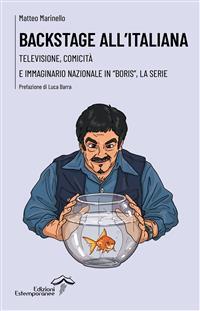
Backstage all’italiana: Televisione, comicità e immaginario nazionale in “Boris”, la serie
작성자
Matteo Marinello
아직 평점이 없습니다
Humor
형식
킨들
페이지
103
언어
이탈리아어
출판됨
Jan 1, 2022
출판사
Edizioni Estemporanee
판
1
ISBN-10
8889508876
ISBN-13
9788889508879
설명
This engaging examination delves into the cultural phenomena surrounding the Italian television series Boris, which first premiered in 2007. As a series that quickly ascended to cult status, it offers a thrilling critique of the inner workings of television, particularly within the context of Italian society and its humorous take on the industry. The author, Matteo Marinello, meticulously critiques the comedic elements woven throughout the show, highlighting how they simultaneously reflect and challenge the national imagination.
Marinello’s exploration is not just confined to the laughs but extends into deeper discussions about authenticity and representation in Italian media. By analyzing characters, narratives, and the show’s unique style, he uncovers layers of social commentary that resonate with audiences. The study cements Boris as a pivotal work, illustrating how it navigates and satirizes the complexities of modern Italian life.
The book unpacks the intricate relationship between humor and cultural identity, presenting Boris as a mirror that reflects societal quirks and the absurdities of television production. Through thoughtful analysis, readers are invited to understand how humor serves as a vehicle for broader cultural critiques, driving home the importance of storytelling in shaping collective consciousness.
In sum, Matteo Marinello's work offers a fresh perspective on Boris, elevating it from mere entertainment to a significant cultural artifact, shedding light on the inseparable ties between comedy, media, and national identity in contemporary Italy.
Marinello’s exploration is not just confined to the laughs but extends into deeper discussions about authenticity and representation in Italian media. By analyzing characters, narratives, and the show’s unique style, he uncovers layers of social commentary that resonate with audiences. The study cements Boris as a pivotal work, illustrating how it navigates and satirizes the complexities of modern Italian life.
The book unpacks the intricate relationship between humor and cultural identity, presenting Boris as a mirror that reflects societal quirks and the absurdities of television production. Through thoughtful analysis, readers are invited to understand how humor serves as a vehicle for broader cultural critiques, driving home the importance of storytelling in shaping collective consciousness.
In sum, Matteo Marinello's work offers a fresh perspective on Boris, elevating it from mere entertainment to a significant cultural artifact, shedding light on the inseparable ties between comedy, media, and national identity in contemporary Italy.